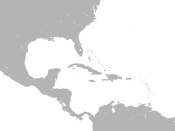Every time we look out the window or go on a road trip, we notice the beautiful scenery that surrounds us, the composition of nature. And we often wonder how a mountain has taken this shape, or how these trees seem to line up to create and seamlessly endless path. Nature has its way of telling it's own history, a story of it's past, and the past of everything that surrounds it. In the postcolonial novel Wide Sargasso Sea, by Jean Rhys, the Caribbean landscape is used as an agent to be interpreted by two different characters, Antoinette and Rochester, in this prequel. Each of them will have a very different opinion of the environment, and will provide an implicit analysis of it. Their assessment will differ on three different levels, which I will be discussing; the landscape will evoke a different sense of place, a different sense of history, and provide them with a different sense of identity.
In the opening of part two of the novel, Rochester describes the scenes that he sees, and reports to us what Antoinette says, which will show us how each one feels about their belonging in the Caribbean. "Everything is too much [...] Too much blue, too much purple, too much green. The flowers too red, the mountains too high, the hills too near. And the woman is a stranger."(59) This quote is by Rochester, and it inevitably shows us that he sees it as if it were a dream. Even his wife is unrecognizable for him. He feels as though he should never belong in such a place. It is very different from what he is used to in England. Its as if this location in the Windward Islands is completely uncivilized. He tires to find similarities between England and this savage land, to be able to seek metal refuge somewhere, and not to be completely isolated. For example he compares the red tropical land to parts of England. Unsuccessfully though, because after that, he feels that the orders of nature have "an intoxicating freshness as if all this has never been breathed before"(61). This shows us that he feels even more isolated, by his sight and his sense of smell. As for Antoinette, she feels very much at ease in this place. She seems to be so familiar with the surroundings, that her husband asks her to identify the types of birds. That is because the birds are part of her Caribbean heritage. Also, she tells him when to wear his coat, foreseeing when it is going to be cold instead of cool. She utilises nature as if she has lived there all her life, making cups out of leafs. Therefore, Rochester does not feel comfortable in the Caribbean, because everything is so unreal to him, whereas Antoinette gives us the impression that this is all she ever wanted, and understands her surroundings.
But to understand her surroundings, she must know the past, the history of the Caribbean, something that Rochester does not seem to be acquainted to. The husband wants to try to discover the history, but he is too blinded by his own, one of a "superior" Englishman. As he walks in the forest, he does not look at the tress on the side, but instead only looks forward. He fails to see what is going on around him, and focuses on his selfish goals. This symbolizes the white man using black people as slaves, without seeing the consequences on the black people, only what good the owners can extract from them. Rochester notices very tall trees growing around the ruins, yet does not interpret it as a new civilization that rose from a destroyed past. We can say that Rochester can see but he is blind, because he does not pay attention to what the landscape is trying to tell him, as with the orange tree. "Under the orange tree I noticed little bunches of flowers tied with grass."(87) Maybe this means that the white man, the orange tree, still dominates the black people, the flowers, but only because they are tied down with something like grass, which could symbolize money in the modern day because of the green colour. But he probably doesn't want to admit this to himself about the past, one that still lives on. That is why he doesn't want to comprehend nature. As for Antoinette, we feel as if the environment and her are communicating, and she's picking up on its signals. When she says "What a beautiful tree, but it is too high up here for mangoes and it may never bear fruit"(90) and right after, she talks about her husband and how he doesn't love her. This is very true because she understands that altitude means evolution, times have changed. Three days earlier, her husband slept with one of his servants. In the past this was very common, but since the tree is too high now, the "man" cannot "go" and bear fruit, neither with Amelie nor Antoinette. She understands that Rochester is trying to stay in the figure of the past, the figure of a powerful Englishman slave owner who sleeps with his slaves. Thus, Antoinette has post-emancipation mentality and can gain from the landscape, and Rochester still wants to live in the past, so he doesn't understand what the trees and flowers are trying to tell him, to let the past go.
But the landscape doesn't only reveal their view of history; it also lets us discover each of their distinctive identity. For example, the Caribbean nights provide comfort and security for Antoinette, because we can see that in the beginning of part two, she whispers her secret and sadness to her husband. She seeks safety behind darkness. Whereas in the day, she is happy and playful, looks at herself in the mirror and sings. The fact that she looks in the mirror during the day shows us that the sun in the island helps her see who she has become, whereas the moonlight provides protection and helps her see who she used to be. This also demonstrates her Caribbean belief of obeah and that she belongs to that South American community. We can see the presence of obeah in her like because of the animals of the islands. For instance, she knows that there will be trouble coming, as she picks up signs from the cock, or from the beetles burning in the flame, identifying her to same type of woman that Christophine is. This is of course before she goes completely mad, since we see that the land and her beliefs doesn't mean anything to her anymore as she was leaving to England, not shedding a single human tear, due to the fact that she died her first dead, lost her identity. As for Rochester, daylight has another meaning for him. Back in England, the day was the time where he could work, when he would go to school and study. He brings his culture with him to the Windward Island, since he sees the day as a time for enlightenment. He goes to talk to Daniel Cosway during the day, to learn about his wife and be guided in his situation. He also wants to postpone the talks with Antoinette to the day, thinking to himself "But this is not the place or the time... not in this long dark veranda with the candles burning low and the watching, listening night outside." Night is more a time for his lust, whether with Antoinette or with Amelie, just like in England where nigh time was when the prostitutes came out and lovers hid in their bed. Furthermore, Rochester does not belong to the Caribbean traditions, since he cannot understand what the wildlife is telling him. When he leaves Daniel Cosways house, he does not understand the meaning of the black and white goat, a sing of mixed race and contrary nature, which represents Daniel. Therefore we can say that Antoinette's identity is well one of a West Indies girl transforming into a mad woman, just like her mother, whereas Rochester carries his dominating English way of life.
Rhys' metaphorical techniques are clearly very sophisticated and she uses the West Indies' landscape to show us the different interpretations of the characters. Rochester doesn't feel like he belongs in the Caribbean, he has an Englishman's perspective on history, and his identity is also one of an English person. Antoinette is very comfortable in her placement, since she carries all the necessary tools and background to comprehend the life around her, until she goes mad. But does the surrounding shape what these two have become, or did they chose to become this way?



Wide Sargasso Sea Landscape and Identity
This essay is well thought out, and the author made valid, well-organized points. Unfortunately, grammatical and usage errors detract from the paper's overall success.
2 out of 2 people found this comment useful.